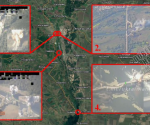Houthis punch the Whore of Babylon on the nose: Iran must be blamed to save face, and more besides
The internet is devoid of any sensible, level-headed commentary regarding the logistics bombing operation, carried out Saturday 14th September, by the Houthis (“anti-Saudi” Yemenis, for simplicity’s sake) on Saudi Arabia’s Abqaiq and Khurais oil processing facilities. But then, the distinct refusal to call a spade a spade, and cunningly maintain “Iranian-involvement” talking points, and in some cases even go so far as to entertain and promote barking-nuts “Israel-did-it” fantasies, would be what the big alternative media is there for and paid to do (with no downside: its audience is too fond of being sent into tail-chasing frenzy to stop being one).
Now that Saudi Arabia has announced that output is to be restored fully in a matter of weeks (after initial tales of woe on a Cassandran scale), it is entirely clear that the effect of the attack by the Houthis on Amraco oil facilities (not necessarily the damage, which is hard to independently guage) has been exaggerated principally by the US, who rushed out imagery ahead of a Saudi Arabian press conference which would loosely blame Iran (criticised by Iranian presidential advisor, Hesameddin Ashena, as “[proving] that Saudi Arabia knows nothing about where the missiles and drones were made or launched from and failed to explain why the country’s defense system failed to intercept them”. Ironically, at the same time, the Yemeni Armed Forces were making their own statements elaborating on their initial claims of responsibility, and expounding upon how the attack was carried out (for instance: “[the] aircraft were powered by jet and normal engines, starting from three basic points by range and route …”).
The upshot is a very simple scenario. The Houthis, being resourceful and creative, made a largely symbolic breach of Saudi defences (meant as a threat of more of the same to come) which was nevertheless so embarrassing to the US – which is deeply embroiled in the same cause by petrodollar treaty – that Iran had to be blamed so as to spare the blushes. The Houthis are supposedly too much of a third rate enemy to be able to carry out such an operation and ransom the Saudis in return for an end of hostilities. Iran, being somewhat more sophisticated militarily, was blamed so that this very special instance of failure of US air defence junk – and by extension, US military capability (and its ever diminishing reputation) – might not cause another large shovel-full of dirt to fall on the CNAC, or the Coffin for the New American Century.
In complementation of this approach – merely confirming the reality: it fitted the denialist attitude of US Government that FBEL has noted before – was the blasé shoulder-shrugging by US Secretary of State Pompeo when asked why there had been a failure:
“We’ve seen air defense systems all around the world have mixed success,” the Department of State press service quoted Pompeo as saying upon his arrival to Jeddah. “Some of the finest in the world don’t always pick things up. We want to work to make sure that infrastructure and resources are put in place such that attacks like this would be less successful than this one appears to have been.”
Readers will of course recognise the spouting of the post-Normal maxim of “learn by the mistake” at the end of the extract, which is basically as much practical use as the penalisation for sin dished out at a confession. It boils down to this: reality is malleable; as such, we choose the existence of a preferred scenario, and then no one stops buying the product. Of course, this can’t be sustained as the brutal facts of life kick the door down – and therein lays the trouble. The Russians have been able to defend their Hmeymim air base and Tartus naval facility from drone swarms on a number of occasions. US junk obviously can’t compete.
The biggest baddest door-kicking fact of life is that the Houtis are fighting a war against Saudi forces – which, incidentally, covertly include RAF and BAE personnel (making any complaints from the British Government about supposed Iranian assistance for the Yemenis the height of hypocrisy; furthermore, that these people would be guilty of committing war crime by assisting in the bombing of civilians is a whole issue in itself). It should be simple to understand in this context where any attack on Saudi infrastructure would come from, especially since the development of Houthi “air forces” has been well documented, and precedence in terms of targeting has been set. These and other inconvenient facts were mentioned in the best coverage by far, a piece by Finian Cunningham that, despite being quick off the mark soon after the event, didn’t keep other alternative media rubbish at bay:
In May this year, Houthi drones hit Saudi Arabia’s crucial east-west pipeline. Then in August, drones and ballistic missiles were reported to have struck the Shaybah oil field near the border with the United Arab Emirates (UAE), as well as the Dammam exporting complex in Saudi Arabia’s Eastern Province.
That being said, Cunningham is as guilty as the rest for worrying his readership about the threat of wider war stemming from an American military response – unfortunately this is a prejudice that only those who are either impossibly perceptive or not on the payroll do not possess. The US Government has no intention of attacking Iran – for reasons that have been carefully and repeatedly explained here at FBEL. So, the definitive indicator of the extent of US embarrassment about the Houthi attack is that it has elicited bellicose language from the White House that must be climbed down from. Or, in other words, it has forced an unnecessary episode of Trumpian “mouth and trousers”. The risk of the White House appearing weak (because the much-anticipated crack of the rod over the impertinent Iranian cranium never comes) is a small price for the US military-industrial complex to pay to save it from reputational damage and financial carnage.
What happened on Saturday was a strategic strike where the design was not so much to hamper Saudi capability, by denial behind the lines, of the wherewithal to bear pressure at the front, but more to cause psychological distress to the Saudis (and to the UAE, which had threats directed against it at the Yemeni press conference). It was effective probably because it was not anticipated. But whether Saudi operators were asleep (although, going by The Guardian story linked to above, one can imagine they are “advised” by Americans to the effective point of being commanded [and the official blurb only consolidates the impression: “Our mission is to enhance U.S. national security through building the capability and capacity of the Saudi Arabian Armed Forces (SAAF) to defend our common interests in the Middle East region.”]), or whether the equipment was installed without the Yemenis in mind, or whether it just didn’t perform, the outcome is all the same: the failure of the Americans to uphold their end of the contract. [A “Russian source” has blamed “low efficiency”, i.e. the Aegis and Patriot systems are overrated.]
The contract in question is protection for Saudi oil production in return for pricing in dollars, and ultimately translating oil sold into American holdings with the purchase of Treasury bonds – nothing less than the basis of the London-Washington global economic system. Treasury bonds – each a sum of debt instrument guaranteed by the US taxpayer – exchanged for the dollars received for the sale of oil. Saudi Arabia, being the largest oil reserve holder, set the standard for the rest of OPEC – so the scheme became universal. There is no detailed financial expertise at FBEL, so the reader must allow a quote from elsewhere for a basic demonstration – and not in a text book way either – of what this means:
Petrodollar recycling was and remains, essentially, the largest institutionalized Ponzi Scheme in history because artificial demand for a currency (the dollar) “is created at the expense of the purchasing power of other currencies”.
The petrodollar is a crucial stanchion of Anglo-globalist hegemony. The threat to it comes (to quote from the same source) “from various economic and political alignments globally”. This is why it would be important not to have the Saudi’s decide that the US is not upholding its side of the bargain, and look for another guarantor. Or more pertinently, to have internal enemies of the ruling Saud clan detect the weakness, and kick it all out. The deal is, after all, a protection racket. In rearguard, the US is relying on its waning ability to perform magic (making illusion more real than the reality), and is getting sterling help from the Saudi military with its aforementioned “Iran-did-it” press conference. As just mentioned, the deal is, after all, a protection racket, and the Saudi military is just not up to seeing the gangsters off their turf, weaknesses or not.
The Houthi attack, then, is symbolic because it alone will not bring the global financial system crashing down – but it does indicate that there is potential for it if such attacks can be reproduced frequently. Indeed, it is an obvious idea that was expressed by Iran’s President Hassan Rouhani on the same day the Saudis were holding their press conference:
The Yemenis… haven’t hit a hospital, they haven’t hit a school, they haven’t hit Sanaa bazaar. They just hit an industrial centre… to warn you…
Learn lessons from this warning and consider that there could be a war in the region.
As a matter of fact, and as suggested earlier in this piece, the Houthis will see their “Second Deterrent Balance Operation” on a more limited scale – the clue is in the name. The idea is to have Saudi Arabia adopt a less zealous approach to prosecuting its war. Be that as it may, the chink in the armour has been discovered, and on the US’ side, there can be no direct attack on the Houthis as a measure to prevent what is potential terminal damage becoming kinetic. An assault on the Houthis is an attack which US military planners would no doubt be easy with given that it resides within their bully-boy, pick-on-the-weak operational parameters. However, there is trouble at the mill: Trump has already vetoed congressional demands to end American indirect involvement in the war that Saudi Arabia is waging on Yemen.
The answer is smoke and mirrors, as it so often is. And despite the best efforts, including that assistance provided by obfuscating alternative media, there can be no disguising the fact that the Houthis have probably delivered the hardest blow to the “rules based international order” (the New World Order) since Syria knocked all those cruise missiles out of the sky, and gained the ability to keep the Israelis at bay (don’t believe the rubbish about Putin denying permission for Israeli operations in Syria. The Israelis are physically restrained by Syrian capability, not by political agreement, and the truth is very likely there to be seen by those who have eyes). As Cunningham honestly puts it, “the much-vaunted American protector [of Saudi Arabian oil] is not able to deliver on its strategic bargain, despite billions of dollars of Pentagon weaponry. That’s why Washington has to find an excuse by casting Iran as the villain.”


















